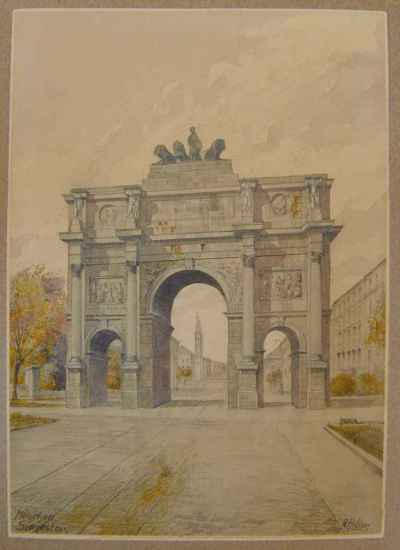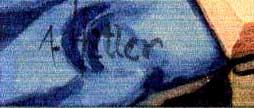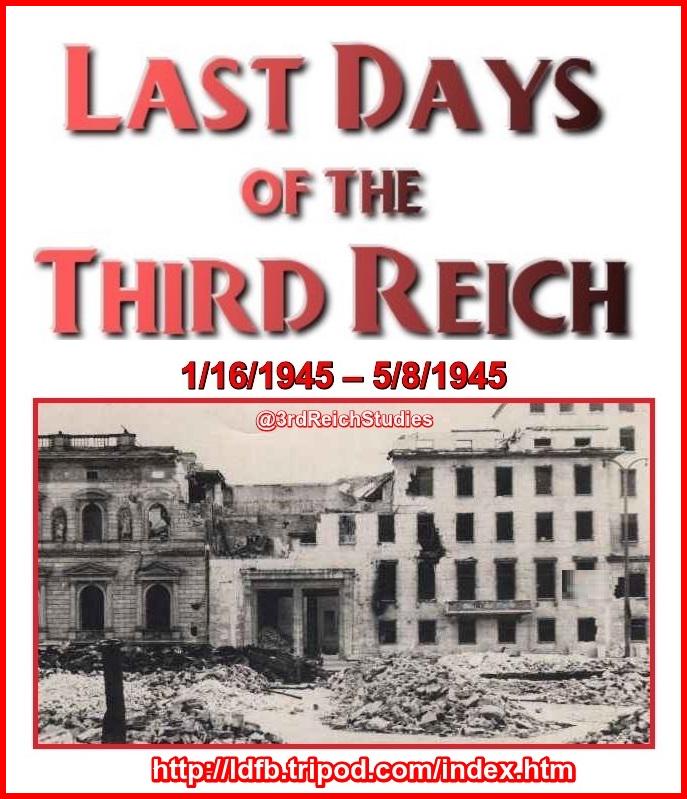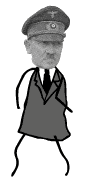
Western Front
Caution: Adolf Hitler was completely wrong about absolutely everything...usually. When Hitler said something that was actually correct, it was merely to set up the next lie. As with all good propagandists—and he certainly was that—he would begin with a few obvious, documented facts, and then proceed to distort them horribly. The infamous German Fuehrer’s worm-tongue rhetoric is NOT to be taken as fact.
As always, read with cautious skepticism.
Dear Herr Assessor Hepp,
I am glad my last postcard reached you. Also, many warm thanks for your welcome letter. I should have written at greater length before, but shall now try to make up for it.
First of all, let me tell you at once, Herr Assessor, that on December 2nd I had the opportunity to acquire, thank God, more than enough experience. Our regiment was not, as we expected, held back in the reserve, but early in the morning of October 29 was thrown into battle, and ever since we have been in those fellows' hair with some interruptions, first as attackers and then as defenders.
After a really lovely journey down the Rhine we reached Lille on October 23. We could already see the effects of the war as we traveled through Belgium. We saw the conflagrations of war and heard its ferocious winds. As far as Douai our journey was reasonably safe and quiet. Then came shock after shock. In some places the base artillery had been destroyed in spite of the strongest defense. We were now frequently coming upon blown up bridges and wrecked locomotives. Although the train kept going at a snail's pace we encountered more and more horrors--graves. Then in the distance we heard our heavy guns. Toward evening we arrived in Lille, which was knocked about rather a lot in the suburbs. We got off the train and hung about around our stacked rifles, and shortly before midnight we were on the march, and at last we entered the town. It was an endless monotonous road left and right with miserable workmen's dwellings and the countryside blackened with smoke. The pavements were poor and bad and dirty. There were no signs of any inhabitants, and there was no one on the street after 9 PM except the military. We were almost in danger of our lives because the place was so full of guns and ammunition carts, and through them we eventually reached the Citadel, and this part of Lille is a bit better.
We spent the night in the courtyard of the stock exchange building. This pretentious building was not yet completed. We had to lie down with full packs, and were kept at the ready. It was very cold on the stone pavement and we could not sleep. The next day we changed our quarters, and this time we were in a very large glass building. There was no lack of fresh sir, the iron framework was still standing, and the panes of glass had been smashed into millions of fragments in the German bombardment.
During the day something more was attempted. We inspected the town and most of all we admired the tremendous military equipment, and all of Lille lay open, the gigantic shapes of the town rolling before our astonished eyes. At night there was singing, and for me it was the last time. On the third night, about 2 AM, there was a sudden alarm, and about 3 AM, we marched away in full marching order from the assembly point.
No one knew for certain why we were marching, but in any case we regarded it as an exercise. It was rather a dark night, and we had hardly been marching for twenty minutes when we turned left and met two columns of cavalry and other troops, and the road was so blocked there was no room for us.
Then morning came. We were now a long way from Lille. The thunder of gunfire had grown a bit stronger. Our column moved forward like a giant snake. At 9 AM, we halted in the park of a country house. We had two hours rest and then moved on again, marching until 8 PM. We no longer moved as a regiment, but split up into companies, each man taking cover against enemy airplanes. At 9 PM, we pitched camp. I couldn't sleep. Four paces from my bundle of straw lay a dead horse. The animal was already half decayed. Finally, a German howitzer battery immediately behind us kept sending two shells flying over our heads into the darkness of the night every quarter of an hour. They came whistling and hissing through the air, and then far in the distance there came two dull thuds. We all listened. None of us had ever heard that sound before.
While we were huddled close together, whispering softly and looking up at the stars in the heavens, a terrible racket broke out in the distance. At first it was a long way off and then the crackling came closer and closer, and the sound of single shells grew to a multitude, finally becoming a continuous roar. All of us felt the blood quickening in our veins. The English were making one of their night attacks. We waited a long time, uncertain what was happening. Then it grew quieter and at last the sound ceased altogether, except for our own batteries, which sent out their iron greetings to the night every quarter of an hour. In the morning we found a big shell hole. We had to brush ourselves up a bit, and about 10 AM there was another alarm, and a quarter of an hour later we were on the march. After a long period of wandering about we reached a farm that had been shot to pieces and we camped here. I was on watch duly that night, and about one o'clock we suddenly had another alarm, and we marched off at three o'clock in the morning.
We had just taken a bit of food, and we were waiting for our marching orders, when Major Count Zech rode up: "Tomorrow we are attacking the English!" he said. So it had come at last! We were all overjoyed, and after making this announcement the Major went on foot to the head of the column.
Early, around 6 AM, we came to an inn. We were with another company and it was not till 7 AM that we went out to join the dance. We followed the road into a wood, and then we came out in correct marching order on a large meadow. In front of us were guns in partially dug trenches, and behind these we took up our positions in big hollows scooped out of the earth, and waited. Soon the first lots of shrapnel came over, bursting in the woods and smashing up the trees as though they were brushwood. We looked on interestedly, without any real idea of danger. No one was afraid. Every man waited impatiently for the command: "Forward!" The whole thing was getting hotter and hotter. We heard that some of us had been wounded. Five or six men brown as clay were being led along from the left, and we all broke into a cheer: six Englishmen with a machine gun! We shouted to our men marching proudly behind their prisoners. The rest of us just waited. We could scarcely see into the steaming, seething witches' caldron, which lay in front of us. At last there came the ringing command: "Forward!"
We swarmed out of our positions and raced across the fields to a small farm. Shrapnel was bursting left and right of us, and the English bullets came whistling through the shrapnel, but we paid no attention to them. For ten minutes we lay there, and then once again we were ordered to advance. I was right out in front, ahead of everyone in my platoon. Platoon-leader Stoever was hit. Good God, I had barely any time to think, the fighting was beginning in earnest! Because we were out in the open, we had to advance quickly. The captain was at the head. The first of our men had begun to fall. The English had set up machine guns. We threw ourselves down and crawled slowly along a ditch. From time to time someone was hit, we could not go on, and the whole company was stuck there. We had to lift the man out of the ditch. We kept on crawling until the ditch came to an end, and then we were out in the open field again. We ran fifteen or twenty yards, and then we found a big pool of water. One after another we splashed through it, look cover, and caught our breath. But it was no place for lying low. We dashed out again at full speed into a forest that lay about a hundred yards ahead of us. There, after a while, we all found each other. But the forest was beginning to look terribly thin.
At this time there was only a second sergeant in command, a big tall splendid fellow called Schmidt. We crawled on our bellies to the edge of the forest, while the shells came whistling and whining above us, tearing tree trunks and branches to shreds. Then the shells came down again on the edge of the forest, flinging up clouds of earth, stones, and roots, and enveloping everything in a disgusting, sickening yellowy-green vapor. We can't possibly lie here forever, we thought, and if we are going to be killed, it is better to die in the open. Then the Major came up. Once more we advanced. I jumped up and ran as fast as I could across meadows and beet fields, jumping over trenches, hedgerows, and barbed-wire entanglements, and then I heard someone shouting ahead of me: "In here! Everyone in here!" There was a long trench in front of me, and in an instant I had jumped into it, and there were others in front of me, behind me, and left and right of me. Next to me were Württembergers, and under me were dead and wounded Englishmen.
The Württembergers had stormed the trench before us. Now I knew why I had landed so softly when I jumped in. About 250 yards to the left there were more English trenches; to the right the road to Leceloire was still in our possession. An unending storm of iron came screaming over our trench. At last, at ten o'clock, our artillery opened up in this sector. One--two--three--five--and so it went on. Time and again a shell burst in the English trenches in front of us. The poor devils came swarming out like ants from an antheap, and we hurled ourselves at them. In a flash we had crossed the fields in front of us, and after bloody hand-to- hand fighting in some places, we threw them out of one trench after another. Most of them raised their hands above their heads. Anyone who refused to surrender was mown down. In this way we cleared trench after trench.
At last we reached the main highway. To the right and left of us them was a small forest, and we drove right into it. We threw them all out of this forest, and then we reached the place where the forest came to an end and the open road continued. On the left lay several farms, all occupied, and there was withering fire. Right in front of us men were falling. Our Major came up, quite fearless and smoking calmly, with his adjutant, Lieutenant Piloty. The Major saw the situation at a glance and ordered us to assemble on both sides of the highway for an assault. We had lost our officers, and there were hardly any noncommissioned officers. So all of us, every one of us who was still walking, went running back to get reinforcements. When I returned the second time with a handful of stray Württembergers, the Major was lying on the ground with his chest torn open, and there was a heap of corpses all around him.
By this time the only remaining officer was his adjutant. We were absolutely furious. "Herr Leutnant, lead us against them!" we all shouted. So we advanced straight into the forest, fanning out to the left, because there was no way of advancing along the road. Four times we went forward and each time we were forced to retreat. In my company only one other man was left besides myself, and then he also fell. A shot tore off the entire left sleeve of my tunic, but by a miracle I remained unharmed. Finally at 2 PM we advanced for the fifth time, and this time we were able to occupy the farm and the edge of the forest. At 5 PM, we assembled and dug in a hundred yards from the road.
So we went on fighting for three days in the same way, and on the third day the British were finally defeated. On the fourth evening we marched back to Werwick. Only then did we know how many men we had lost. In four days our regiment consisting of thirty-five hundred men was reduced to six hundred. In the entire regiment there remained only thirty officers. Four companies had to be disbanded. But we were all so proud of having defeated the British! Since that time we have been continually in the front lines. I was proposed for the Iron Cross, the first time in Messines, then again at Wytschaete by Lieutenant Colonel Engelhardt, who was our regimental commander. Four other soldiers were proposed for the Iron Cross at the same time. Finally, on December 2, I received the medal.
My job now is to carry dispatches for the staff. As for the mud, things are a bit better here, but also more dangerous. In Wytschaete during the first day of the attack three of us eight dispatch riders were killed, and one was badly wounded. The four survivors and the man who was wounded were cited for their distinguished conduct. While they were deciding which of us should be awarded the Iron Cross, four company commanders came to the dugout. That meant that the four of us had to step out. We were standing some distance away about five minutes later when a shell slammed into the dugout, wounding Lieutenant Colonel Engelhardt and killing or wounding the rest of his staff. This was the most terrible moment of my life. We worshiped Lieutenant Colonel Engelhardt.
I am sorry, I will have to close now. The really important thing for me is to keep thinking about Germany. From eight in the morning to five in the afternoon, day after day, we are under heavy artillery fire. In time even the strongest nerves are shattered by it. I keep thinking about Munich, and there is not one man here who isn't hoping that we shall soon finish off this rabble once and for all, make mincemeat of them, at whatever the cost. The hope is that those of us who have the good fortune to see our homeland again will find it purer and less corrupted by foreign influence. The sacrifices and misery exacted daily from hundreds of thousands of people, the rivers of blood flowing every day against an international world of enemies will, we hope, result in smashing Germany's external enemies and bring about the destruction of our internal internationalism. That would be better than any territorial gains. As for Austria, it will come about as I have already told you.
Once more I express my heartiest gratitude and remain your devoted and grateful, ADOLF HITLER



Twitter: @3rdReichStudies FB: Horrific 20th Century History















